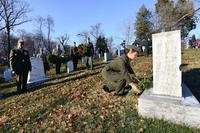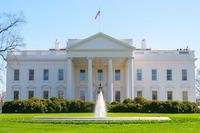The Department of Veterans Affairs acknowledged criticism of its plan to distribute memorial urns and plaques in a final rule published Friday -- namely, that accepting an urn might bar later burials in veteran cemeteries -- but said it didn't have any choice under the federal law that authorized the new benefit.
Both the National Association of State Directors of Veterans Affairs and the National Funeral Directors Association lodged concerns earlier this year over the new benefit and how it might have negative consequences for those who also seek burials.
A 2021 law change expanded the section of the U.S. Code that already authorized the VA to issue "headstones, markers, medallions and burial receptacles" by adding "urns and commemorative plaques," according to information previously provided with the proposed rule. The new authority came as part of the Johnny Isakson and David P. Roe, M.D. Veterans Health Care and Benefits Improvement Act of 2020, enacted the following year.
The urns and plaques will denote the individuals' status as veterans and will be furnished at the government's expense.
But one provision of the VA's rule, in particular, had the organizations worried, and it hasn't changed -- the part that says families forgo a veteran's burial in a national cemetery after accepting an urn from the VA.
The Minnesota Department of Veterans Affairs had argued that an item of "such relatively low cost" as an urn or plaque shouldn't deny veterans the "significant" benefit of burial in a national cemetery, a benefit "that also provides perpetual care."
Groups also contended that the provision might unnecessarily preclude veterans from being buried together with their spouses when, for example, a family decides they want to place a veteran's cremated remains in their spouse's rightful national cemetery plot.
The VA addressed that concern Friday by pointing out that the prohibition is specific to national cemeteries and that accepting an urn or plaque doesn't preclude burial in other types of veterans cemeteries. States also operate veterans cemeteries separately from the VA's National Cemetery Administration.
The organizations also predicted in their comments that the offer of a free urn could result in future generations mishandling a veteran's remains that might otherwise be securely interred. Another worry: Families might be caught off guard and leave cremated remains unclaimed once they realize interment is off the table.
The VA said it plans to try to warn families of the potential pitfalls of accepting an urn or plaque.
"VA will continue to raise awareness of the limitations of [the new law] by providing detailed information about the commemorative plaque and urn program," according to the supplementary information provided with the final rule.
It also hopes its definition of an "applicant" will "minimize the potential for unintended forfeitures of benefits, family disputes and duplicate claims." To receive an urn or plaque, an applicant "must certify they are authorized to make decisions about the disposition of the veteran's remains and certify their awareness of other precluded benefits."
The VA also addressed a suggestion that it create a process in which families could return an urn and have the veteran's full burial benefit reinstated.
"Even if VA agreed with the commenter's suggestion to implement a return process in this final rule, VA has no authority to do so," according to the department.
The VA did not address a prior query by Military.com about whether it incurred an added responsibility by introducing the incentive, in the form of an urn, for a family not to inter a veteran's remains.
However, in the supplementary information, the VA said it "has no jurisdiction over a commemorative plaque or urn once it has been furnished and must defer to a veteran's family members to maintain control of a furnished plaque or urn as their personal property."
The VA said it has no ability to control the circumstances that may result in the remains of veterans becoming unclaimed by a family member or personal representative.
The department said it "has several benefit authorities supporting unclaimed veterans and those who bring remains to VA to ensure dignified burials," but in the case of a veteran whose family opted for an urn or plaque, burial in a national cemetery will not be an option.





















